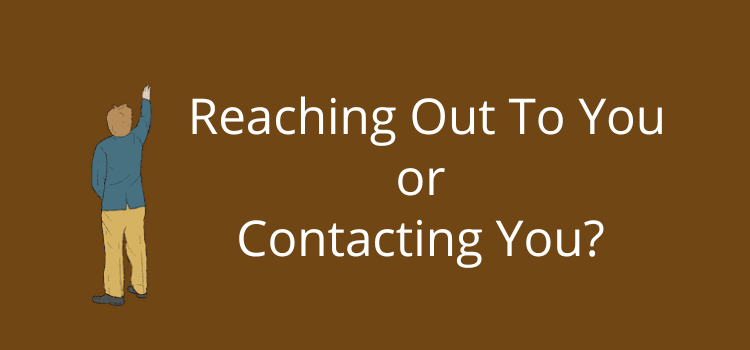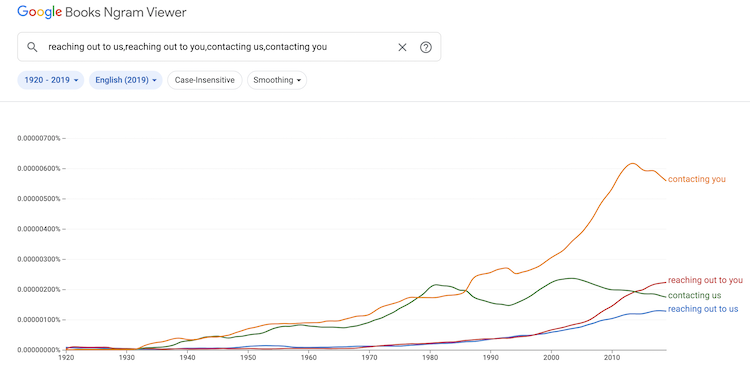I’m reaching out to you, or I’m contacting you? Do you have a preference?
Perhaps both are okay for you.
I might be showing my age, but I prefer to be contacted than reached out because it’s grammatically impossible to use it in the passive voice.
That’s the problem with invented language; sometimes, it doesn’t work.
Issues I have with people reaching out to me
The phrasal verb, reach out, requires an object. He reached his hand out to help her.
So without an object, it’s unclear what is being reached out.
Another problem I have with the expression is that it is now standard fare for email spammers and auto-reply emails.
Thank you for reaching out to us with your issue. We are a bit busy right now, but we will get back to you as soon as possible.
So many automated and spam emails I receive use this introduction.
It’s also a problematic term for those prone to typos who don’t use a spell checker.
I received an email wanting to sell me something. But it was hard to be convinced when the message read:
I am retching out to you…
Needless to say, it made me wonder if the sender was feeling a little nauseous.
How did the expression originate?
You might be surprised to learn that it originated in a series of ads for AT&T in the 1970s.
It’s a long story, but you can read the retro memories about it all here.
The central theme of the ad campaign was “reach out and touch someone.”
I can’t verify it for sure, but an article in the AFR refers to AT&T co-opting the phrase from the 1966 Motown hit by The Four Tops, Reach Out (I’ll Be There).
The timing fits well with the progression of the use of the phrase.
You can see that reaching out to us, or you both entered everyday use in the 1970s.
Thankfully though, contacting you has remained the most popular term.
But all of the terms took a sudden leap after 2000. You would have to presume that this was because of the introduction of the Internet and email.
Changes in our language
I have to say that I accept and enjoy the evolution of our language.
Have you taken a selfie today? If you have, thank Australians for inventing the word.
I’m happy to use the term anti-vax instead of anti-vaccine.
Words and expressions enter our language every day, and I often check the list of new words entering the Oxford English Dictionary.
And yes, Oxford lists the phrasal verb.
(reach out) chiefly North American – seek to establish communication with someone.
But it still gets on my nerves, even if it’s a valid expression.
I would never use reach out, and when I receive an email using it, I immediately think, yep, it’s probably spam.
Does it have the same effect on you?
Alternatives to reaching out to
There are plenty of options you can use depending on the type of correspondence.
Generally, though, you are probably using email more than anything else.
You can probably think of many possibilities, but here are ten quick suggestions.
1. I’m writing to you…
2. I’m contacting you…
3. Just letting you know…
4. I’d like to touch base with you…
5. I was wondering if…
6. I’m getting in touch with you because…
7. I wanted to let you know…
8. Just writing to say…
9. I’m sending you this message because…
10. I know you’re busy, but…
Of course, there is an eleventh option. Forget the introduction and get straight to the point.
It’s really a US thing
For my US readers, I understand that because of the frequency of use, you could be a bit blind to or blazé about the term.
After all, many US companies and major sites probably have a directive from their communications department to use the term.
But for my British, Australian, New Zealand, South African, and Indian readers, I can imagine that it’s a phrase that grates a little.
As Mark Twain said, “why use a five-dollar word when a fifty-cent word will do.”
The phrase is not only unnecessarily long, but it’s also vague in its meaning. Reaching? Reaching what out?
Reach out as much as you like, but I’m too far away to be able to grab your hand.
Summary
I’m all for innovation, change, and inventiveness in English, but this one is a step too far for me.
It sounds spammy and trite, it’s too long, and it’s not a logical phrase.
If you are reaching out to me, good luck in getting past my spam filter.
But if you are contacting me, writing to me, or even better, getting straight to the point, you stand a much better chance of getting a reply.
The post Reaching Out To You Or Contacting You? Who Gets A Reply? appeared first on Just Publishing Advice For Writers and Authors.
Go to Source
Author: Derek Haines


